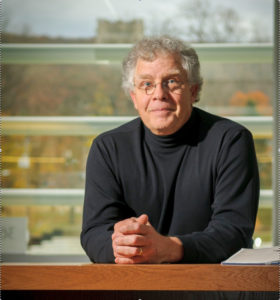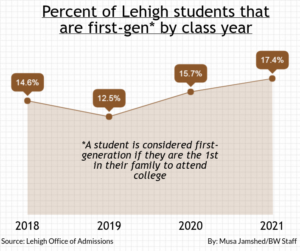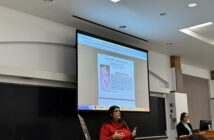
Dr. George White is the role Managing Director for Student Access and Success. Dr. White has been working at Lehigh for over 28 years, and was previously the associate professor of educational leadership and training. (Courtesy of Dr. George White)
The stress of navigating hundreds of stairs and gothic buildings can be daunting for any first-year Lehigh student.
However, for first-generation students — students who are the first in their families to attend college —experiencing new endeavors can be overwhelming.
Bruce Bunnick, the interim vice provost for admissions and financial aid, said 17.4 percent of students identified as first-generation in the class of 2021. This is an increase from the 15.7 percent in the class of 2020, 12.5 percent in the class of 2019, and 14.6 percent in the class of 2018.
With an increase in first-generation students on campus, Lehigh has created a new position to help facilitate resources and guidance for the incoming students.
George White officially assumed the role of managing director for student access and success on Sept. 1.
“With the changing demographics of the population coming to college, we recognize and embrace that the talent we seek will be spread across an increasingly diverse population,” President John Simon wrote in an email. “As increasing numbers of low-income and first-generation students seek access to 4-year colleges, Lehigh must be positioned to attract, recruit, enroll and retain this growing student talent pool.”
Simon said Lehigh has made a university-wide commitment to the American Talent Initiative.
White has worked at Lehigh for over 28 years in varying capacities. Most recently, he has served as a professor in the Educational Leadership program as well as the director of the Center for Developing Urban Educational Leaders. White is responsible for establishing this center, which prepares individuals to become principals and superintendents in national and international urban areas.
White said the goal of his new position is to recognize talented first-generation and low-income students whom Lehigh did not identify during the initial stages of the admissions process. Once the students are identified and admitted, White’s job is to ensure they have a successful Lehigh experience.

White will work with Bunnick and other administrative officials to help students adjust. White said he is excited to take on his new role because he too was a first-generation student from a low-income family.
“There is a personal passion for me in this,” White said. “To some extent there is a way to close the circle — give back and help Lehigh better support students like I was. There were people who took interest in me, and in a large extent, we do (the same) — we just need to make sure it’s done in a systematic way.”
White will work closely with various offices across campus to assist with student identification, recruitment, admission, support and graduation.
Using expertise from his previous position, White will also identify first-generation students beyond the tri-state area. He is reaching out to alumni who are now principals and superintendents in urban areas to find out how Lehigh can broaden its applicant pool.
White said he will work to determine barriers first-generation students might face once they arrive on campus. Discerning what these barriers might look like will allow him to provide mentorship opportunities to help the students adjust.
White said, for example, a first-generation student might have a hard time paying tuition in the fall if they had an unpaid internship over the summer.
These are the kinds of challenges White hopes to ease.
“There are many bright, resilient students, but they don’t know what the college experience is all about because mom and dad didn’t go to college,” White said. “There was nobody else in their family that went to college. They don’t know what they don’t know in order to be successful.”
White continues to meet with first-generation students to hear their stories.
He said he is learning what works for students, what is missing and what needs to improve.
“I want the raw experience of knowing what it was like coming in as a freshman and understanding the struggles as an upperclassman,” White said.
So far, White has met with several focus groups consisting of six to eight students from Lehigh University Student Scholars Institute, Rapidly Accelerated Research Experience and F1RST. These groups aim to provide resources for first-generation, low-income and underrepresented students.

Kevin Ly, ’19, is the president of F1rst. The class of 2021 has the largest population of first-generation students among the classes currently at Lehigh. (Lauryn Ragone/B&W Staff)
President of F1RST, Kevin Ly, ’18, and treasury secretary Jocelin Gregorio-Alarcon, ’18, are trying to improve access to resources across campus.
Gregorio-Alarcon was asked to participate at an American Talent Initiative conference next week in Washington D.C., where she is one of two students in the country to speak to 84 institutions about her experience as a first-generation student.
White said Lehigh is already being recognized for some of its first-generation work, but there is still more work to be done as more first-generation students come to campus.
“Institutions like Lehigh have an obligation to reach (first-generation students) in the recruitment stage,” Bunnick said. “We want to be aware of them in our applicant pool and are doing our best to recruit as many as we can.”
Applicants identify as first-generation students through the Common Application. Bunnick said the Common Application recently changed the way it asks if applicants are first-generation students.
The Common Application describes a first-generation student as an individual who resides with a parent or guardian who records zero college experience or has only received an associate’s degree.
Bunnick said when a student identifies as first-generation, they are not treated any differently in the applicant pool. He said the admissions office makes applicant decisions regardless of the students’ ability to pay for tuition.
Jennifer Mertz, the director of financial aid, said to accommodate the increase in first-generation students, the financial aid budget comes from the endowed sponsored scholarship and the university’s operating budget — tuition-generated revenue.
Bunnick said Lehigh has the means in place to meet 100 percent of students’ calculated financial aid.
“We hope to attract as many students as we can to improve the overall diversity on the campus,” Bunnick said.





Comment policy
Comments posted to The Brown and White website are reviewed by a moderator before being approved. Incendiary speech or harassing language, including comments targeted at individuals, may be deemed unacceptable and not published. Spam and other soliciting will also be declined.
The Brown and White also reserves the right to not publish entirely anonymous comments.